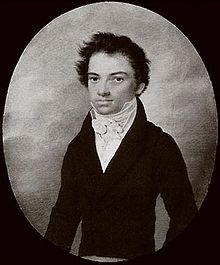
The Trio for piano, flute and bassoon in G major, WoO 37, is a composition for piano trio by Ludwig van Beethoven that was discovered amongst Beethoven's papers following his death. Believed to have been composed in his teens and demonstrating the influence of Mozart, the composition remained unpublished until 1888, when it was published in the supplement to the complete set of the composers works by Breitkopf & Härtel.
Background
According to Cooper, Beethoven composed the work around 1786, when he was 15 years old. The intended recipient is supposed to be the Count Friedrich Von Westerholt, an amateur bassoonist, whose daughter Anna Maria was taking piano lessons from Beethoven.
Instrumentation
The composition is scored for piano, flute, and bassoon.
Movements
The composition is in three movements:
- Allegro
- Adagio
- Thema Andante con Variazioni
A typical performance takes around 26 minutes.
References
- Notes
- Blakeman 1992, p. 4
- ^ Hewitt & Müller-Schott 2011
- ^ Cooper 2000, p. 21
- Sources
- Anderson, Keith (2018). Beethoven, L. van: Flute Works, Vol. 2 (CD). Naxos. 8.573570. Archived from the original on 2021-06-26. Retrieved 2018-05-04.
- Blakeman, Edward (1992). Beethoven: Serenade/Trio/Duo (PDF) (CD). Chandos Records. CHAN9108. Archived from the original (PDF) on 2015-09-23.
- Cooper, Barry (2000). Beethoven. United States: Oxford University Press. ISBN 0191592706.
- Hewitt, Angela; Müller-Schott, Daniel (2011). "Program Notes: Beethoven Chamber Series - Concert 2". Emmanuel Music. Retrieved 2015-08-23.
- Van de Bogart, Becky (2011). "Concert Program: September 23 & 25, 2011". Nebraska Chamber Players. Archived from the original on 2016-03-04. Retrieved 2015-08-23.
- Watson, Angus (2012). Beethoven's Chamber Music in Context. Woodbridge: Boydell Press. ISBN 978-1-84383-716-9.
External links
- Trio for Piano, Flute and Bassoon in G major, WoO 37: Scores at the International Music Score Library Project
- "Beethoven: Trio for Piano, Flute and Bassoon in G major, WoO 37 (Shannon Hesse (Piano), Patricia George (Flute) & Hunter Thomas (Bassoon))". YouTube. 2013-06-22.
This article about a composition for a chamber music group is a stub. You can help Misplaced Pages by expanding it. |